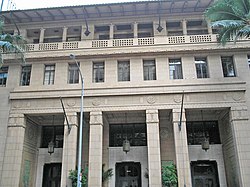Alexander and Baldwin
 |
|
| Public | |
| Traded as | : ALEX S&P 400 Component |
| Industry | Real Estate, Agriculture |
| Headquarters | Honolulu, HI, United States |
|
Key people
|
|
| Revenue | |
| Total assets | |
| Total equity | |
|
Number of employees
|
806 (2016) |
| Website | www |
|
Alexander and Baldwin Building
|
|

Headquarters built in 1929
|
|
| Location | 822 Bishop Street, Honolulu, Hawaii |
|---|---|
| Coordinates | 21°18′46″N 157°51′54″W / 21.31278°N 157.86500°WCoordinates: 21°18′46″N 157°51′54″W / 21.31278°N 157.86500°W |
| Built | 1929 |
| Architect | Charles William Dickey, Hart Wood |
| NRHP reference # | 79000755 |
| Added to NRHP | September 7, 1979 |
Alexander & Baldwin, Inc. is an American company that was once part of the Big Five companies in territorial Hawaii. The company today operates businesses in real estate, sugarcane, and diversified agriculture. It was also the last "Big Five" company to cultivate sugarcane. It remains one of the State of Hawaii's largest private landowners, owning over 87,000 acres (35,000 ha) throughout the state. In addition, the company owns 47 income properties in Hawaii and the continental United States.
Alexander & Baldwin has its headquarters in downtown Honolulu at the Alexander & Baldwin Building, which was built in 1929. The Alexander & Baldwin Sugar Museum exhibits some of sugarcane company's history.
In 1831, Dwight Baldwin (1798–1886) and Charlotte Fowler Baldwin were sent by the American Board of Commissioners for Foreign Missions (ABCFM) as medical missionaries to the Sandwich Islands, as the Hawaiian Islands were called at the time. Reverend William Alexander and Mary McKinney Alexander arrived the following year in 1832.
Alexander & Baldwin was founded by their sons Samuel Thomas Alexander and Henry Perrine Baldwin (1842–1911) as Samuel T Alexander & Co., in 1870. The two purchased 561 acres (227 ha) of land on the island of Maui between Pāʻia and Makawao, on which they began to cultivate sugarcane.
The land the partners cultivated was semi-arid former dry forest, not ideal for growing sugarcane, a crop that required much water. Samuel Alexander realized that rain was plentiful miles away in the rainforests on the windward slopes of Haleakalā mountain. Thus, he designed a 17-mile (27 km) long irrigation aqueduct that diverted water from that part of Haleakalā to their plantation. Work started on the aqueduct in 1876 and was completed two years later in 1878.
...
Wikipedia

